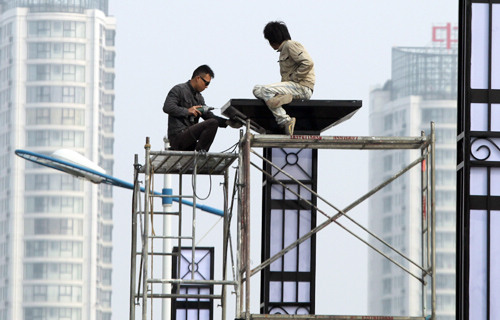|
 |
|
POSSIBLE BUBBLE BURST: Workers are fixing lamps near a commercial housing complex (CFP) |

The global economy faces an uncertain future. China also faces challenges to ensure steady economic development. Wei Jianing, Deputy Director of the Department of Macroeconomic Research of the Development Research Center of the State Council, shared his views with Financial News on how China will prevent financial risks and reform its financial system in 2012. Edited excerpts follow:
The global financial crisis can be divided into several stages: From August 2008 to the bankruptcy of Lehman Brothers in September 2008 was the U.S. sub-prime mortgage crisis; after September 2008 it became the international financial crisis; and as of October 2009 when Greek sovereign debt crisis broke out, the crisis became a sovereign debt crisis. The question is: Is the European currency crisis now in a new stage? And what comes next?
We think the present U.S. and European sovereign debt crisis is the aftershock of the U.S. sub-prime crisis, and also the pre-shock that will bring future international financial market more turmoil and push the world economy into another recession. Recently Standard & Poor's placed the European Union on its watch list, and some countries are preparing for the EU to balkanize, so we must be prepared for this crisis.
As for the euro crisis, I think we need to decide whether to come to the rescue or not.
In rescuing the EU, there are three methods: The European Central Bank issues banknotes to rescue the euro; the euro zone issues euro bonds; or it creates a Europe rescue fund. However, these methods are all difficult to carry out and may trigger inflation.
If not rescued, three outcomes are possible: Southern European countries will leave the EU, which may lead to imported inflation; the euro zone breaks up and northern European countries issue new core currency, which may lead to sharp rises of the exchange rate and their economy may stagnate; or each country resumes its own currency, so that the currency of Germany, the European economic development engine, will appreciate sharply and export of German goods will be seriously affected, then debtor nations such as Greece and Spain will lose aid and collapse.
There is another choice, or the only way out for the euro, which is to advance a uniform fiscal policy and establish a uniform country, just like the United States that was established as a federal country hundreds of years ago. But the question of whether the public and politicians of various countries have enough consensus needs to be researched.
The Chinese economy faces three major risks: burst of real estate bubbles, risks of local government financing platforms and split of capital chains for private lending.
As for the burst of real estate bubbles, in 2009 the central bank revealed real estate loans accounted for 21 percent of the country's newly increased loans, a relatively high portion. The question is whether the economy can achieve a soft landing after the bubbles burst. During the Great Depression in the United States, the real estate bubbles popped before stock market bubbles. Recently, during the sub-prime crisis, stock market bubbles were first to go, followed by those of the real estate market.
| 